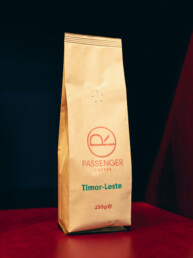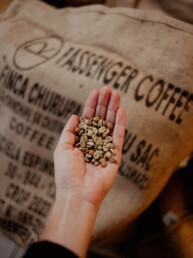Timor-Leste Laclo Natural
Timor-Leste Laclo Natural – some wild gourmet fix
This extraordinary coffee stems from the forests of Laclo village in the northern hills of the Ermera district of Timor-Leste. It is processed at the Raimutin Community Wet Mill, which was established by the non-profit coffee trading organization Raw Material in 2018 and has since acted as a hub to reach out to resident farmers and provide them with a viable option in the specialty market.
Coffee trees in East-Timor grow wild - scattered in the forest and almost entirely left on their own devices with limited intervention and attention by the farmers. There is only very limited agronomic attention taking place and the wild grown coffee is therefore by naturally organic. Until it comes to harvesting the farmers merely visit their crop and more likely gather coffee than actually grow it.
The coffee consists of the Typica and Hybrid de Timor Variation.
Last mentioned is a rare interspecific cross between coffee arabica and coffee canephora aka robusta identified on the island in 1917. This spontaneous natural hybrid obtained fame due to its outstanding resistance to coffee rust and vigour and was soon cultivated in other coffee regions around the world. Cross breeding led to the popular Hybrids like Catimor, Ruiru or Sarchimore.
Despite the close relationship to the canephora species, the Hybrid de Timor coffee is acclaimed for fine stonefruit notes in its taste profile with a low acidity. At the same time this variation with its resilient character is in focus of important research which deals with climate change and its effects on coffee cultivation. The economic situation of Timor–Leste calls for an urgent fix and coffee is an important player for the island and its population of which 25% are relying almost solely on coffee. While the countries former No.1 petroleum industry sieges, the agricultural sector and foremost the coffee export as the most valuable crop for the country is being revitalized and improved. Due to poor infrastructure the production costs are on a high level and the improvement of processing and education of the farmers a crucial step towards a prospering coffee economy on Timor-Leste.
In the cup it develops sweet nectar and floral notes accompanied by a soothing taste of baked plum on a creamy like mouthfeel with a medium body.
16. May 2025
ONE EASY PIECE | Changing the habit - one cup at a time.
Seit dem 1. Mai berechnen wir 30 ct für To-Go-Becher. Nicht, weil wir gerne Gebühren erheben,…
30. April 2025
Why coffee is getting more expensive - and what that means for you
es ist an der Zeit, euch über die Preisexplosion auf dem Kaffeemarkt zu informieren – über die…
25. March 2025
Summer in a glass: our new Cold Brew
Die Sonne steigt höher, die Tage werden länger und die Luft summt vor Vorfreude auf die Wärme. Es…
28. January 2025
(No) extra charge for (Oat) milk!
PASSENGER serves you a universe of coffee in your cup - without compromise. We...
15. November 2024
Subscriptions are free of shipping costs from the second delivery onwards
News from the delivery front: The journey of coffee - from the bean to your cup - is...
17. July 2024
Concentrated sunshine
Caffeine is a psychoactive substance which, in the right dosage, can have a stimulating effect on the consumer's perceptual apparatus.






